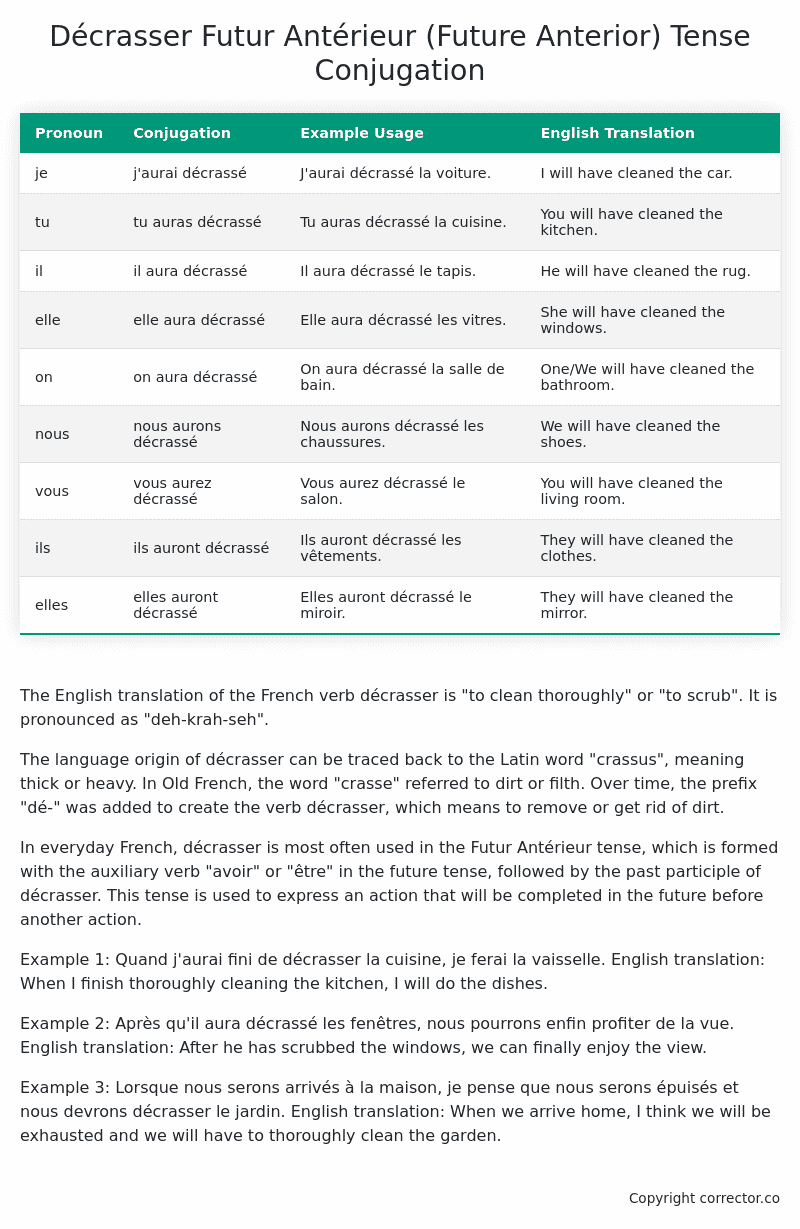Futur Antérieur (Future Anterior) Tense Conjugation of the French Verb décrasser
Introduction to the verb décrasser
The English translation of the French verb décrasser is “to clean thoroughly” or “to scrub”. It is pronounced as “deh-krah-seh”.
The language origin of décrasser can be traced back to the Latin word “crassus”, meaning thick or heavy. In Old French, the word “crasse” referred to dirt or filth. Over time, the prefix “dé-” was added to create the verb décrasser, which means to remove or get rid of dirt.
In everyday French, décrasser is most often used in the Futur Antérieur tense, which is formed with the auxiliary verb “avoir” or “être” in the future tense, followed by the past participle of décrasser. This tense is used to express an action that will be completed in the future before another action.
Example 1: Quand j’aurai fini de décrasser la cuisine, je ferai la vaisselle.
English translation: When I finish thoroughly cleaning the kitchen, I will do the dishes.
Example 2: Après qu’il aura décrassé les fenêtres, nous pourrons enfin profiter de la vue.
English translation: After he has scrubbed the windows, we can finally enjoy the view.
Example 3: Lorsque nous serons arrivés à la maison, je pense que nous serons épuisés et nous devrons décrasser le jardin.
English translation: When we arrive home, I think we will be exhausted and we will have to thoroughly clean the garden.
Table of the Futur Antérieur (Future Anterior) Tense Conjugation of décrasser
| Pronoun | Conjugation | Example Usage | English Translation |
|---|---|---|---|
| je | j’aurai décrassé | J’aurai décrassé la voiture. | I will have cleaned the car. |
| tu | tu auras décrassé | Tu auras décrassé la cuisine. | You will have cleaned the kitchen. |
| il | il aura décrassé | Il aura décrassé le tapis. | He will have cleaned the rug. |
| elle | elle aura décrassé | Elle aura décrassé les vitres. | She will have cleaned the windows. |
| on | on aura décrassé | On aura décrassé la salle de bain. | One/We will have cleaned the bathroom. |
| nous | nous aurons décrassé | Nous aurons décrassé les chaussures. | We will have cleaned the shoes. |
| vous | vous aurez décrassé | Vous aurez décrassé le salon. | You will have cleaned the living room. |
| ils | ils auront décrassé | Ils auront décrassé les vêtements. | They will have cleaned the clothes. |
| elles | elles auront décrassé | Elles auront décrassé le miroir. | They will have cleaned the mirror. |
Other Conjugations for Décrasser.
Le Present (Present Tense) Conjugation of the French Verb décrasser
Imparfait (Imperfect) Tense Conjugation of the French Verb décrasser
Passé Simple (Simple Past) Tense Conjugation of the French Verb décrasser
Passé Composé (Present Perfect) Tense Conjugation of the French Verb décrasser
Futur Simple (Simple Future) Tense Conjugation of the French Verb décrasser
Futur Proche (Near Future) Tense Conjugation of the French Verb décrasser
Plus-que-parfait (Pluperfect) Tense Conjugation of the French Verb décrasser
Passé Antérieur (Past Anterior) Tense Conjugation of the French Verb décrasser
Futur Antérieur (Future Anterior) Tense Conjugation of the French Verb décrasser (this article)
Subjonctif Présent (Subjunctive Present) Tense Conjugation of the French Verb décrasser
Subjonctif Passé (Subjunctive Past) Tense Conjugation of the French Verb décrasser
Subjonctif Imparfait (Subjunctive Imperfect) Tense Conjugation of the French Verb décrasser
Subjonctif Plus-que-parfait (Subjunctive Pluperfect) Tense Conjugation of the French Verb décrasser
Conditionnel Présent (Conditional Present) Tense Conjugation of the French Verb décrasser
Conditionnel Passé (Conditional Past) Tense Conjugation of the French Verb décrasser
L’impératif Présent (Imperative Present) Tense Conjugation of the French Verb décrasser
L’infinitif Présent (Infinitive Present) Tense Conjugation of the French Verb décrasser
Struggling with French verbs or the language in general? Why not use our free French Grammar Checker – no registration required!
Get a FREE Download Study Sheet of this Conjugation 🔥
Simply right click the image below, click “save image” and get your free reference for the décrasser Futur Antérieur tense conjugation!

Décrasser – About the French Futur Antérieur (Future Anterior) Tense
Construction
Common Everyday Usage Patterns
Interactions with Other Tenses
For example
Summary
I hope you enjoyed this article on the verb décrasser. Still in a learning mood? Check out another TOTALLY random French verb conjugation!


